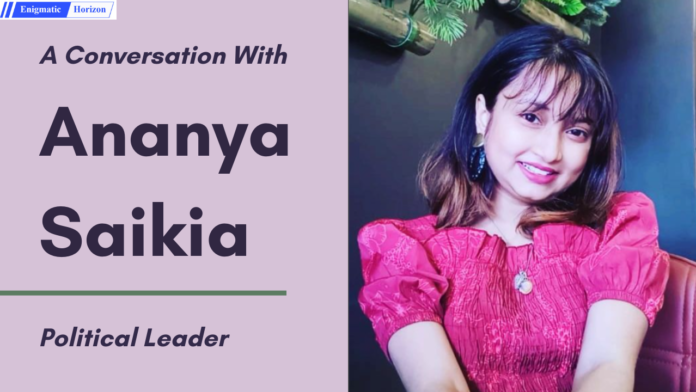Interviewed by – Mohsin Khaiyam (Senior sub-editor)
Written by – Priyanka Bhattacharya (Sub-editor)
Edited by – Robin Bhuyan (Editor-in-Chief)
Ananya Saikia is a prominent figure among the contemporary youth. A faculty at J.B. Law College in Guwahati, she is also a youth leader, and the spokesperson for the Assam Jatiya Parishad. Ananya is a former member of the Congress party, and the general secretary of the student-run organization, “Indian Students Organization.” Read on to learn more about her views on politics and life.
You’re now associated with AJP, which is now an important party in Assam. At present, this party is allied with Congress and other opposition groups. Do you think AJP will continue to exist throughout time?
I believe that political leaders as well as representatives of the youth and student organizations are unified in their call to oppose today’s “fascist” and “communal” movements. We must distinguish between fascism as a political movement seeking power and fascism as a force that has taken control of the state. The notions used by fascism are easily recognizable and have distinct contextual and political contours. AJP, like every other political party operating in India, is currently more concerned with sticking out for the interests of the populace and giving the voiceless a platform than winning seats or elections. Furthermore, I am certain that AJP will persevere in the face of hardship.
Has the solidarity of Gaurav, Akhil, and Lurinjyoti Gogoi heightened Fascism? Are the controversies philosophical in nature?
I firmly disagree that it represents a sort of unity; rather, I believe it is a collection of ideals that they all hold in common in an effort to counter fascist rule. They have strengthened their hold on local party structures and backed the growth of regionalism. They have inspired people to cultivate a spirit of unity and brotherhood that aims to defend Assam’s interests and advance the welfare and prosperity of its citizens.
What according to you are the youths’ perceptions and attitudes towards Politics, Employment, and Education? Where are the youths of Assam heading towards?
I feel that the inability of the youth to effectively participate in any important decision-making processes is a key problem. Young men and women feel alienated and marginalized in their cultures and communities because they have little chance and exposure to actively engage in inclusive decision-making processes. We all possess the ability to influence other people. Some leaders are the doers who seek no accolades. We’re all leaders. We should never delegate leadership or make it someone else’s responsibility. Personal leadership development is one of the most powerful things we can never accomplish.
You’re serving as the General Secretary of ISO, which is a mass organization without ties to any political party. Could you possibly throw some light on this organization?
It serves as a stage for young people to display their abilities. They want to alter the political landscape but they are not interested in joining the electoral process. Journalists, doctors, and individuals from many walks of life are all trying to make Assam a better place. We are aiming to provide education to those who are unable to obtain it. It is less of an organization and more of a platform. Organizations are often associated with political arenas where individuals advance their political views, but ISO is working to improve the quality of life for young people in Assam.
Prior to representing AJP, you were affiliated with Congress. Do you still have ties to its members?
Yes, I’m still in touch with my former coworkers. Political differences shouldn’t ever be a source of conflict. Though opinions may differ, prejudice shouldn’t result from them. Ideologies are created by individuals depending on their interests and social connections. I developed an interest in politics at the age of 15 or 16 when I was not even permitted to vote. My priorities have changed as I’ve gotten older, and I’ve realized that I value regionalism more than anything else. I want to be certain that I’m serving the interests of the residents of my state. Standing up for Assam’s youth motivates me and I wish to put an end to societal injustice and prejudice.
Aside from your current responsibilities, please give insights into your life as an advocate and the state of law and order in Assam.
Despite having finished my education in law, it would be premature to refer to me as an advocate because I have witnessed my father’s hardships in the legal profession. I feel I need to gain more knowledge. I think I have many obligations to my state and its citizens as a lawyer. Law and order in Assam has let us down in several ways. Though it could have been, nothing has changed. The Home Ministry’s understanding of law and order in the state of Assam may be gained by considering the case of Ms. Junmoni Rabha, an Assam Police sub-inspector, who died inexplicably and the lack of a thorough inquiry into it. Thus, I feel many changes are needed!
